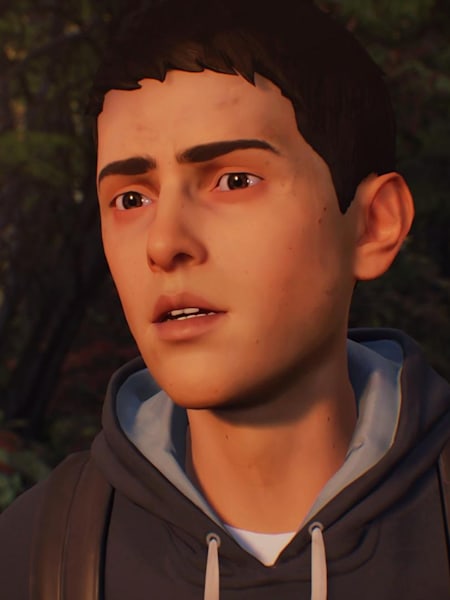Are you a saint or a sinner? For a long time, those two options have been the main extent of your choices in a video game. Do you venture into a collapsing building to save the puppies or do you burn it to the ground and go on your way? Angelically good or devilishly evil. That's it, no middle ground. And what would change? Maybe you'd get a compliment or two from passing townsfolk or perhaps you'd start to sprout demon horns from your head for some reason. It's all a bit too binary.
Yet, over time, games have experimented with the idea of being morally grey: presenting you with choices that don't scream out as being one good and one bad decision. The consequences of these actions aren't so clear cut, either, so whatever you choose to do, you're not sure whether you’ll be improving or worsening the situation. Altogether, this move has opened up games to more adventurous, unpredictable and involving storytelling.
It still feels like there's more to do, though, and the developers who continue to explore video game stories in unique ways is Dontnod. The French team, who rose to prominence in 2015 with the original Life is Strange, have established a reputation for being one of the proponents of advancing narrative games in interesting new directions. The sequel is already looking to take further steps forward by centering your choices around a relationship, and how what you do changes the way someone sees you, acts around you and develops as a person.
15-year-old Sean and nine-year-old Daniel Diaz are the focal point of Life is Strange 2 – two brothers who've been thrust into an impossible situation after a terrible accident that sends them fleeing on a road trip across North America. As the elder of the two, it falls on Sean to become Daniel's guide and protector in the world. That fatherly role then falls on the player, and is exactly where Dontnod has honed in their choice and consequence system for the game. As co-director, Michel Koch explains.
"Over the course of the game, most of your actions, the things you do and the things you say will have consequences on Daniel," Koch explains. "He'll be around you, he'll listen to you, and he'll look at what you're doing. Education is a core theme and the basis of the choices and consequences in Life is Strange 2, where you'll have to decide what kind of brother you'll be, and what kind of actions you'll make to take care of Daniel."
It's a far different approach to what was taken in the original game. In that, your choices mostly affected the state of the world, and Max's position in it. As an indecisive high school student, the ability to rewind time to make different decisions was the perfect representation of her anxieties of entering adulthood, and the responsibilities that come with that. There's an entirely different focus for the sequel, though, while still maintaining the feel of a Life is Strange game.
"We wanted to evolve both the choice and consequences system for Sean, because it won't only affect his story – like, say, the character of Max from the first one – but it will have an effect on another character too," says co-director Raoul Barbet. "This is where it was interesting for us to link to the notion of education. If you choose something for you, it can change your life and have some consequences for you, but here it's even more important, because it will have some consequences on Daniel himself."
That presented a unique challenge for the team, though. How do you create a character who's capable of naturally reacting and responding to the choices the player makes, while also having a personality that can be influenced over the course of not just one episode, but an entire game? Koch explains how a lot of work went into the AI for Daniel, and what he'll be doing in each moment to ensure you feel like he’s a real person who you can form a connection with, thus giving your choices a whole lot more emotional weight.
For example, there'll be moments when Daniel casually notices things in the environment that you can then comment on in different ways to elicit a different response. You may want to reassure him about potential threats in the forest to make him feel safe or jokingly play up the danger to give him a little scare. Whatever you choose, it'll all feedback to how he looks up to Sean.
That's also balanced with Sean's wants and desires, though, as a teenage boy who'd rather be living his life, hanging out with his friends and getting drunk, rather than in this harrowing situation as guardian to his innocent younger brother. "He just wants to live his teenage life, and so the idea was to put the player in the same situation. I hope we manage to make the player love Daniel as if he was their own little brother, and think hard about all those choices for him," says Barbet.
To make that as authentic as possible, the team came together to draw on their collective experiences with family and siblings. Michel explains that one of the game's writers, Jean-Luc Cano, drew a lot from time spent with his daughter, while other Dontnod developers delved into their memories to create situations and moments in the game that would make the relationship between Sean and Daniel feel more genuine. They may find themselves in a tough and difficult situation, but it was important to have kind and gentle moments between the two brothers to show that side of the relationship, too.
That was so vital to show, because it all comes back to Sean and Daniel being at the centre of the narrative. There isn't some chart or graph or notification to represent how the decision you've made has altered the game. Your choices as Sean don't necessarily make you more good or evil, nor are they going to drastically alter the state of the world. It's the personal story you’re creating that matters.
"For me, what's important for us in this kind of narrative adventure game is to make the player feel that this is their own story," says Barbet. "I think what's important for us is that every choice you can make you will have small consequences. It won't be the death of a character or a new scene, but adding those small consequences I think gives the right feeling to the player that this is really his story, and his choices that make it progress."
Dontnod plan to keep developing that over the course of Life is Strange 2, too. While they, understandably, won’t be drawn to reveal too much about what lies in the future for Sean and Daniel, Koch is willing to let us in on a few secrets.
"What you saw in Episode One is that there are already a lot of smaller variations on Daniel, based on what you do. Over the course of the other episodes, Sean and Daniel are on a journey so they'll meet various different characters, and they'll visit various locations," he says. "What you've told Daniel, and what has happened to him, will not only have an impact on himself and Sean, but also sometimes on other characters you will meet. I think any more than that we can't really say."
It all sounds mightily intriguing for now, and will keep us anticipating the release of Life is Strange 2's next episode in the near future, where we'll get a chance to see how Dontnod's approach to choices in Sean and Daniel's relationship expands further.









